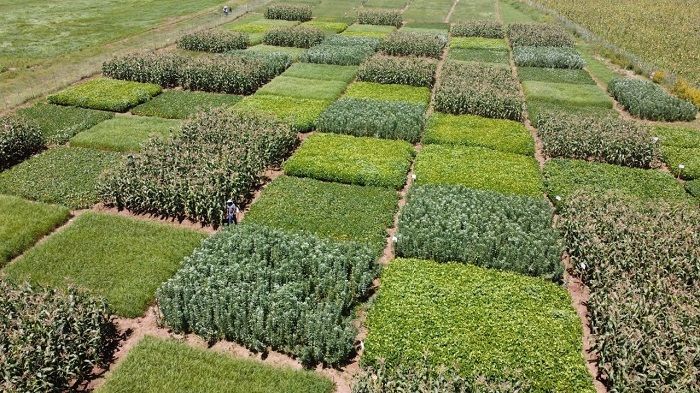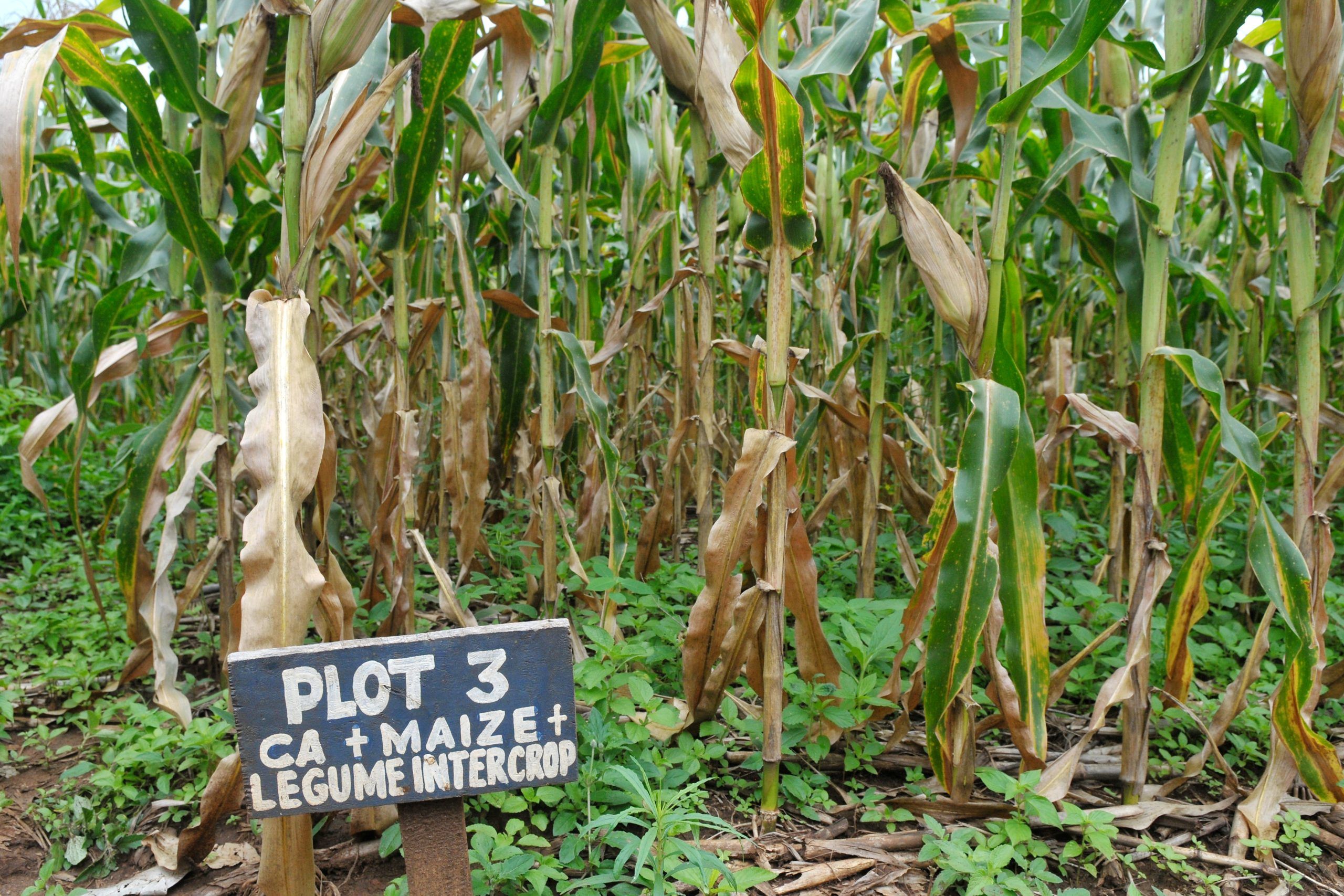Improving Ethiopia’s Agricultural Systems Through Collaborative Research
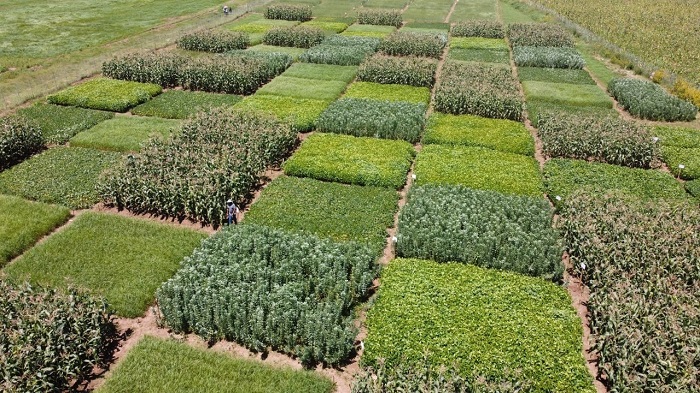
A collaboration effort between CIMMYT and Ambo University has positioned CIMMYT as the national leader in implementing high-impact technologies to improve the quality and quantity of cereal crop production in Ethiopia. This partnership, established over three decades ago at national and regional levels, has become a vital element in driving innovations and advancements in the agricultural sector.
A recent field visit to the LTEs, which were established three years ago, at the Abebech Gobena Agricultural Research Center in Guder, West Shewa Zone of the Oromia Region, demonstrated the importance of collaboration between research and development partners. The LTEs were established to study three main climate-smart interventions: nutrient management (including organic, inorganic, and residue-based practices), crop rotation, and intercropping, over an extended period of time. The event highlighted CIMMYT’s ongoing efforts to improve Ethiopia’s agricultural production, particularly by testing agronomic practices that increase yields and enhance soil health through the use of different organic fertilizers along with inorganic fertilizer and proper cereal-legume rotation over the past two years at the center and in farmers’ fields.
Focus areas of research
Research will focus on developing the best combination of locally available organic inputs with inorganic fertilizer, together with appropriate cereal-legume rotation on LTE plots, to monitor yield and soil health parameters such as organic matter accumulation over time, improve resource use efficiency, and enhance soil health. The main crops involved are:
- Maize (Zea Mays): Jibat variety
- Wheat (Triticum aestivum): Wane variety
- Teff (Eragrostis teff): Quncho variety
- Legumes: Faba bean, soybean, haricot bean, and pigeon pea
The LTE sites have served as demonstration and learning platforms for local communities. The cropping system in the area has traditionally been dominated by continuous monocropping of cereals for decades. In response, this collaborative LTE initiative has introduced four legume crops into rotation and intercropping systems, three of which are new to the area. Some of these new crops have been well received by farmers, who have selected the most promising options to try on their fields as “baby trials,” with the LTE plots referred to as “mother trials.” These efforts have been accompanied by training and resources for farmers and extension workers.
Community engagement and outcomes
The initiative has involved 55 farmers from three villages, with a focus on optimizing crop yields and promoting sustainable agriculture. Dr. Tesfaye Sida, an Agronomist/Sustainable Agrifood Systems at CIMMYT, highlighted the importance of these trials in improving food security and soil health in the intervention areas. He added, “This streamlined client-based collaboration, based on capacity development and knowledge transfer, is helping us to drive the pathways for climate-resilient, sustainable, and inclusive agricultural development for food and nutrition security in Ethiopia.”
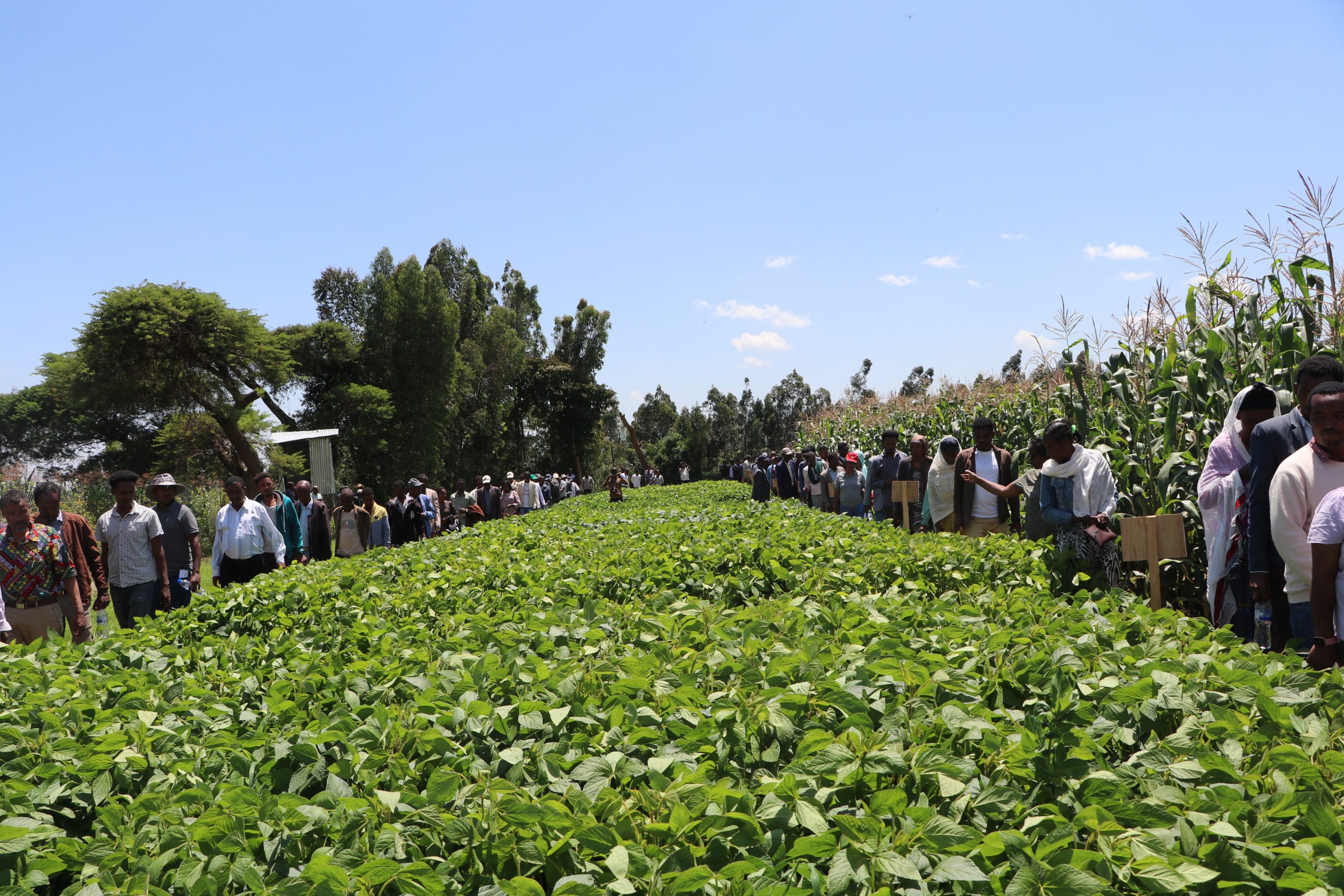
On September 23, 2024, a significant stakeholder gathering, including academic professionals, research and development partners, and farmers, as well as local government decision-makers, visited the trial sites to observe the research activities and progress at the Guder Mano Mezemer campus in Birbirsa village, where CIMMYT and Ambo University are conducting collaborative research. During the event, Dr. Gizachew Kebede, a soil scientist at CIMMYT, highlighted the dual focus of the research: crop rotation and soil nutrient management. “Despite farmers’ familiarity with crop rotation, they often face challenges in identifying the best companion crops and appropriate sequences. We are addressing this by rotating cereals such as maize, wheat, and teff with legumes such as soybean and pigeon pea, some of which are new to the system and likely to improve soil fertility and system resilience. The other fascinating part of the research is the testing of both organic and non-organic fertilizers, an intelligent approach to determining best practices for soil health and productivity, with a particular focus on understanding long-term effects, with plans extending for at least a decade. This kind of knowledge transfer is crucial to improving agricultural productivity and sustainability in the community, and we have seen great results from the trials so far.”
Dr. Tesfaye Shiferaw, an agronomist/Sustainable Agrifood Systems emphasizes the model. “Initially these were long-term experiments (LTEs), which mainly established the long-term impacts of interventions (nutrient management, crop rotation, intercropping, etc.) on climate change effects, productivity, and soil health. However, during the demonstrations of these LTEs, local farmers expressed interest in trying the agricultural technology/intervention/practice of their choice. We then added potential other technologies that could be options and allowed them to conduct their own mini-trials (called baby trials) to increase the number of alternatives. In this context, the LTEs can now be referred to as “mother trials.”
Research collaborators also echoed this sentiment. Dr. Nigusie Bekele, Director of Guder Mezemer Campus, highlighted Ambo University’s pride in hosting trials and major events related to their research collaboration with CIMMYT. He emphasized the university’s commitment to multidisciplinary research and service to the community, noting that their partnership with CIMMYT is instrumental in this regard, particularly in promoting productive, inclusive, and resilient food systems in Ethiopia. Dr. Nigusie described their joint action research and innovation efforts as transformative, benefiting not only the local community but also the wider Ethiopian population dependent on smallholder agriculture.
New launch of common beans and farmer insights
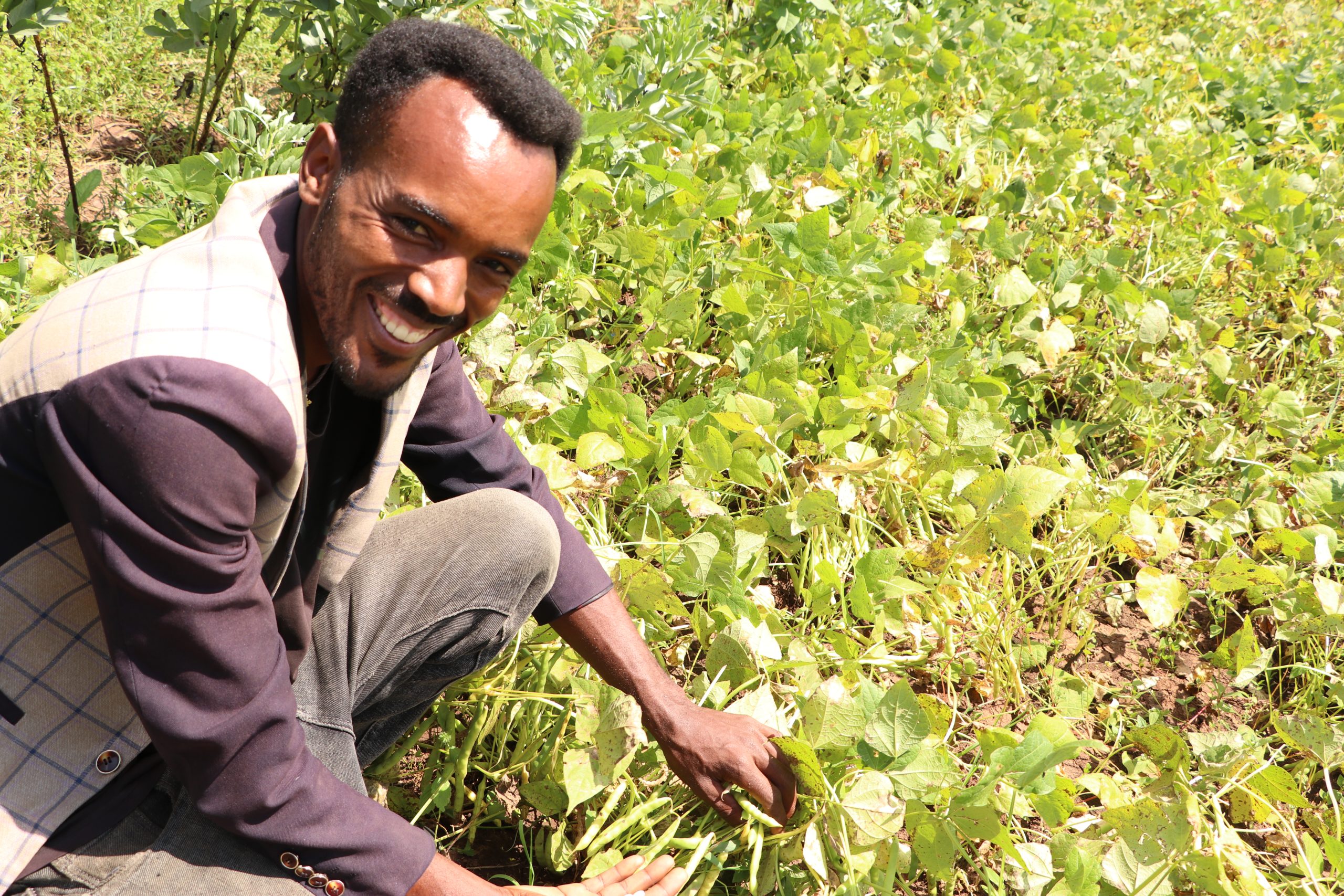
The photo features young farmer Shelema Hirpasa proudly displaying a thriving crop of haricot beans grown after receiving seeds from CIMMYT. This image highlights the positive impact of research and support in increasing agricultural productivity and empowering local farmers.
The introduction of soybean and pigeon pea in the intervention villages has generated considerable interest among farmers, leading to increased participation and positive results. Farmer Shelema Hirpasa from Tuke Kutaye District was enthusiastic about the exceptional performance of these new crops, noting a stark contrast with the traditional varieties he had previously grown. Highlighting the advantages of crop diversification, he said: “I have been involved in farming since my childhood but have never seen such performance in my crops.” This reflects the transformative impact of these new agricultural practices on local farming communities.
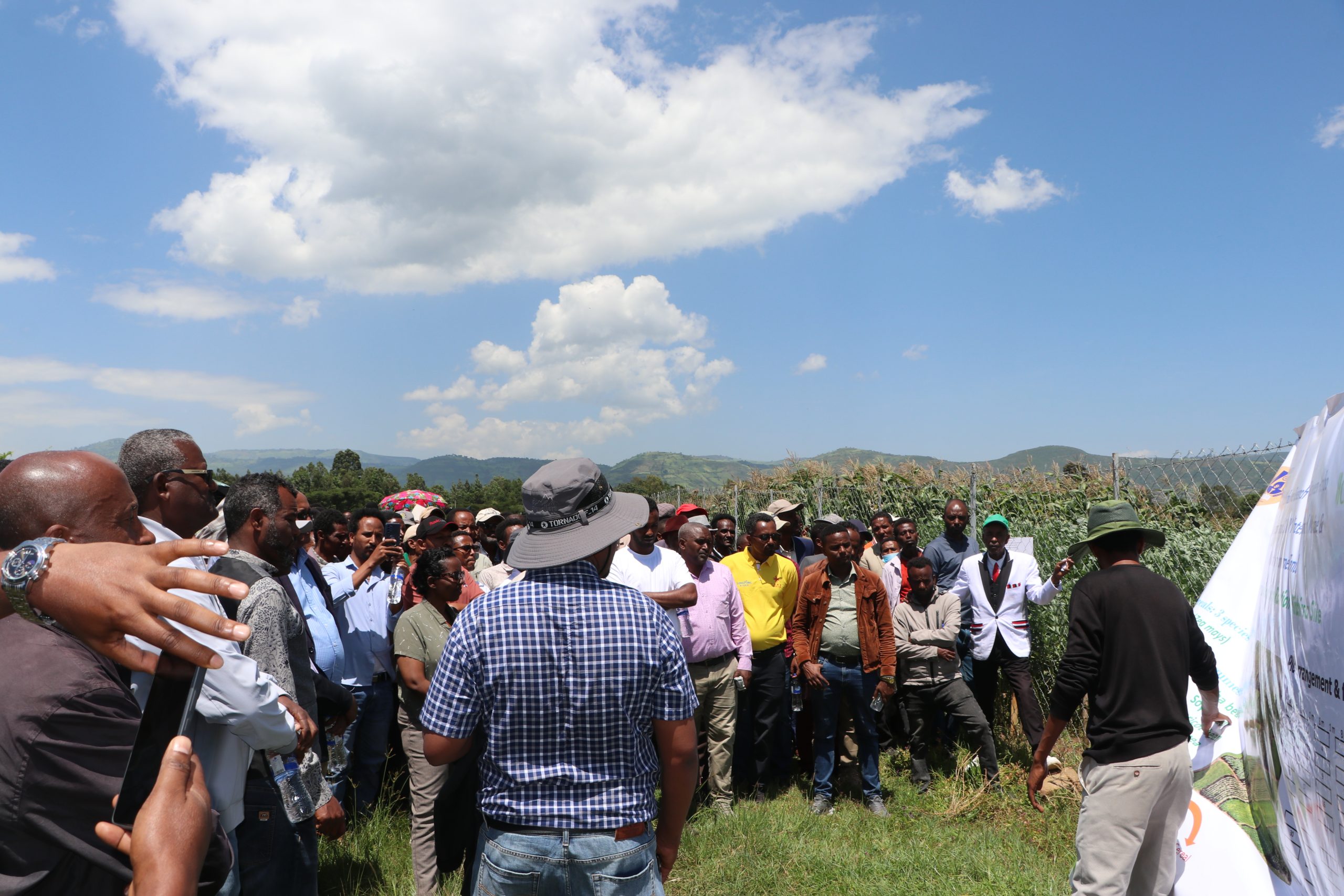
This interaction highlights the importance of knowledge sharing and engagement in agricultural research, as stakeholders learn about innovative practices and advances being implemented in the field. The gathering also reflects the commitment of the various partners in the initiative, showcasing their shared interest in advancing agricultural research and promoting food security through collaboration between CIMMYT and Ambo University.
Media coverage and future directions
The collaboration and field visits have drawn media attention, with coverage from outlets such as the Oromia Broadcasting Network (OBN). This initiative, implemented by CIMMYT and Ambo University with support from One CGIAR’s Excellence in Agronomy (EIA) and Ukama Ustawi initiatives, is paving the way for sustainable and resilient agricultural practices in Ethiopia.
Through continued partnership and innovation, CIMMYT and Ambo University are not only transforming agricultural practices in the region but also contributing to the broader goal of food and nutrition security throughout Ethiopia.
